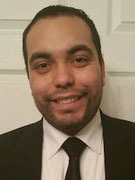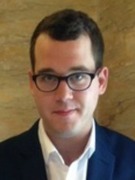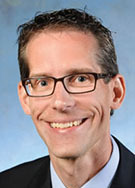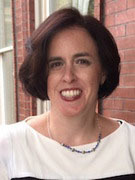Grant Recipients
Four Scholars Receive Initial Hesburgh Research Travel Grants
In May 2016, the Cushwa Center for the Study of American Catholicism named four inaugural recipients of the Rev. Theodore M. Hesburgh, C.S.C., Research Travel Grant program, an initiative created to support projects that consider the legacy of Father Hesburgh, late president emeritus of the University of Notre Dame.
“The projects proposed by these scholars affirm Father Hesburgh’s broad influence on society and the Church,” said Kathleen Sprows Cummings, director of the Cushwa Center and associate professor of American studies and history. “The selection committee is looking forward to the insights that will emerge from each of these projects, and we are confident that the new Hesburgh Research Travel Grant program will stimulate exciting research well beyond this first round.”
The grants, which are open to scholars of any academic discipline, will be awarded twice a year through 2018. They defray travel and lodging costs related to conducting research at the University of Notre Dame Archives.
Hesburgh was a longtime supporter of the University Archives, according to Wm. Kevin Cawley, senior archivist and curator of manuscripts. “The records he sent us over the years document more than half a century of Notre Dame’s history. Because of Father Hesburgh’s active participation in many outside organizations, his papers are also of interest to scholars from a wide variety of disciplines.”
The first record of Hesburgh sending documents to the Archives dates from July 1971, and for many years the Archives received his non-current files on an annual basis. The Hesburgh collection now occupies more than 500 feet of shelf space and contains recordings, photos, microfilm, digital data, and other media in addition to his papers. The Archives acquired more of Hesburgh’s documents after his death in February 2015, although these latest additions are not yet available to researchers.
The following four scholars (next page) are the first to receive Hesburgh Travel Grants. Applications for the Hesburgh Research Travel Grant are reviewed twice yearly. The next round of proposals are due April 1, 2017.

Eladio B. Bobadilla is a doctoral candidate in history at Duke University. His project,“One People without Borders: Chicano Roots of the Immigrants’ Rights Movement,” looks at the shift that occurred in the 1960s and ’70s regarding Mexican Americans’ understanding of immigration, and how that shift happened despite a struggling economy, high unemployment, and losses for organized labor. “The work of people like Theodore M. Hesburgh led to significant changes in the way Mexican Americans perceived the question of the immigrants, and led to a more welcoming, compassionate, and politically united stance,” Bobadilla said. He will be examining papers related to the Select Commission on Immigration and Refugee Policy and the Immigration and Refugee Concerns files.

Michael Franczak is a doctoral candidate in history at Boston College. His project, “U.S.Foreign Policy in the North-South Dialogue, 1974–1982,” will analyze the transformation of U.S. foreign policy that occurred during the 1970s, specifically how the dialogue between the global North and the global South helped to shape neoliberalism, neoconservativism, and human rights. Franczak’s interest in Hesburgh relates particularly to human rights. “Hesburgh used his prominence in American political life to convince politicians that the division of the world into a rich North and a poor South was the greatest threat to world peace. For Hesburgh, any vision of human rights that did not also prioritize economic rights—access to food, shelter, health care, and education—was incomplete at best,” he said. Franczak will be examining correspondence as well as files related to the Overseas Development Council; the UN Conference on Science, Technology, and Development; the Council on Foreign Relations; and the Committee of Americans for the Canal Treaties.

Edward Hahnenberg is professor of theology at John Carroll University. His research project, “Theodore M. Hesburgh, Theologian,” explores how Hesburgh’s theology of the Catholic laity influenced his leadership in Catholic higher education. “The larger goal [of the project] is to inform contemporary conversations about the mission and identity of Catholic universities by placing the question of the university’s relationship to the Church within a broader ecclesiological framework,” Hahnenberg said. He will examine Hesburgh’s speeches, sermons, correspondence, and other writings between 1945—the year Hesburgh completed his dissertation on the laity for his doctorate in theology at the Catholic University of America—and 1967, the year that he oversaw the transfer of governance of the University of Notre Dame from the Congregation of the Holy Cross to a lay board of trustees.

A. Maureen Wangard is an independent researcher who is adapting her dissertation, titled “Reinert as Servant Leader: Assessing the leadership of Father Paul Reinert as President and Chancellor at Saint Louis University,” into a book. Reinert and Hesburgh were friends for more than five decades, both serving as Catholic university presidents in the lead-up to Vatican II and the years following the council’s close. In 1967 Reinert served as Hesburgh’s advisor during the Land O’Lakes conference, the landmark event at which American Catholic university leaders met to discuss how their institutions might respond to the call of Vatican II and modernize Catholic university academics and governance. Wangard will examine correspondence files in the Hesburgh collection and papers related to the International Federation of Catholic Universities.